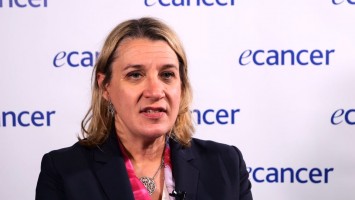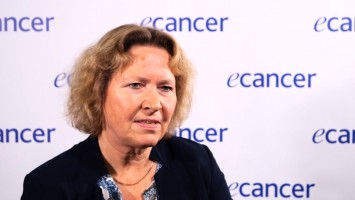35th ESMO Congress, 8–12 October 2010, Milan
Interview with Professor Giorgio Parmiani (Fondazione San Raffaele del Monte Tabor, Milan, Italy)
Clinical benefits and side effects of Ipilimumab in melanoma patients
You, of course, are a big expert in this area and you’ve been working with the melanoma drugs. There seems to be a couple of really interesting things happening – there’s the BRAF story and there’s the Ipilimumab story and you’ve got experience with both of these drugs?
No, we’ve got experience with Ipilimumab but not yet with anti-BRAF drugs, that will happen in one or two months from now. They are launching a new protocol which targets, as you know, the mutation of BRAF and this will be important because the early data suggests that responses are up to 60 or 70%. Then there is a development of resistance so you have to change the drug over, but certainly in terms of tumour responses it’s the most important drug we have seen at the moment.
For a very long time. When can you last remember seeing something that did that?
No.
No, it’s very exciting and there’s some interesting data here at the ESMO meeting on it. So that’s the BRAF inhibitor and then Ipilimumab you have worked with and you’ve treated patients with it?
Yes.
And how has that gone?
Well we are still treating patients and the quite unexpected way of response is that patients at the beginning have several side effects and then they start to tolerate the antibody and the tumour is controlled much later than usually when you use chemotherapy. This is due to the fact that the immune system requires time to mount an immune response and to keep them going for months so patients start to have a regression after a progression, which is quite unusual.
I seem to recall in the very early trials of Rituximab in some of the difficult lymphomas that we also saw that and I’ve seen some spectacular photographs, we took CTs of large masses of lymph nodes in the abdomen that took six months to actually show some sort of response. But if you listen to the patient, the patient felt better quite quickly. So is that also the case with Ipilimumab, the patients knows it’s helping or not?
No, this is not a new finding actually. If you go back in the few cases in which immunotherapy has worked we have five or six patients that appeared to be cured after many years in different types of trials. And even in that case the immune response starts to become a clinical response after five or six months so this is really a specific feature of Ipilimumab and many other probably immune responses.
So what sort of side effects did you see early on?
Well at the beginning you may see a skin rash; you may see the most frequent, in about 50% of cases, is gastro-intestinal; toxicity with diarrhoea, sometimes grade 3 and 4, so these patients have to be well informed of what to do in case they are suffering with this as one of the side effects.
And generally speaking you’ve been thinking about giving steroids?
Yes, we should give steroids in those cases, which is, in a way, contradictory with the immune therapy drug we are administrating but it’s unavoidable otherwise. There have been a couple of perforations, colon perforations, in one of the patients.
It’s quite important then to educate the patient and also probably to educate the doctor because this is a new class of drugs in melanoma and diarrhoea for the usual General Practitioner with a patient with cancer, assuming it’s cytotoxic, it would not be steroids.
Correct. In fact we have a procedure which involves the General Practitioner and the patient knowing what is going to happen to him and his doctor is supporting. Because if there’s diarrhoea in phase 3 or 4 in two or three days, he has to be supported by his family doctor and then he can decide to bring him to the hospital.
Other side effects? You were remarking earlier that there was a lack of some autoimmune diseases and manifestations that you would have expected?
Yes, that was unexpected. We thought that one of the major autoimmune toxicity would be against the melanoma normal antigens like those involved in the tyrosine synthesis, like GP100, like Melan-A/MART-1 which are very frequently expressed, some of them in 100% of melanoma cells. However, we did not see that, we saw less than 5% of vitiligo which is no more than the general population, you see it in 1 – 2%. So it was much less than expected.
However, we saw other types of toxicity like iriditis or hypophysis sometimes, the mechanism was really not completely clear. The simplest one would be an autoimmunity reaction against the body because the antibody removed the brake of the immune system and the immune system continues to attack the tissues.
And thyroiditis, or not?
No. Well sometimes yes, but thyroiditis is much more common in many different types of treatments so it doesn’t seem to be a peculiar toxicity of this drug, this treatment.
But overall these toxicities are manageable, provided you know that these are of an autoimmune, or possibly an autoimmune, basis. And overall your impression of this new approach to melanoma?
Well it’s the first time that we’ve seen statistically significant difference in the survival. The last phase III study that is going to be published clearly shows that you are doubling the overall survival after three years. So it still is not the drug that will cure 100% of patients and in addition the toxicity should be managed in such a way to reduce the risk of permanent damage, but as I said, the first time in addition to the BRAF that we see a drug which clearly appears to be effective in metastatic melanoma patients.
So are these drugs going to find their way into earlier treatment, into adjuvant treatment or what do you think the future is going to be?
Well adjuvant treatment is on-going already in phase III patients, it is free. The international labs, European and US, in Australia also. And in addition to that there are several studies on-going of combining the antibody with chemotherapy, with other biological therapy, in an attempt to increase the effectiveness without increasing simultaneously the toxicity.
And also, presumably, the antibody might be tested with vaccines, because there are several of them around, there are several candidates.
Yes. A couple of studies have already been done, I would say without much success in terms of synergy. Vaccination by itself can give you a 10 - 15% response rate, Ipilimumab gives you not much more as a monotherapy, but the combination doesn’t seem in the early studies to increase significantly the outcome of these patients.
Professor Parmiani, thank you very much indeed for giving us five minutes at this busy ESMO.








